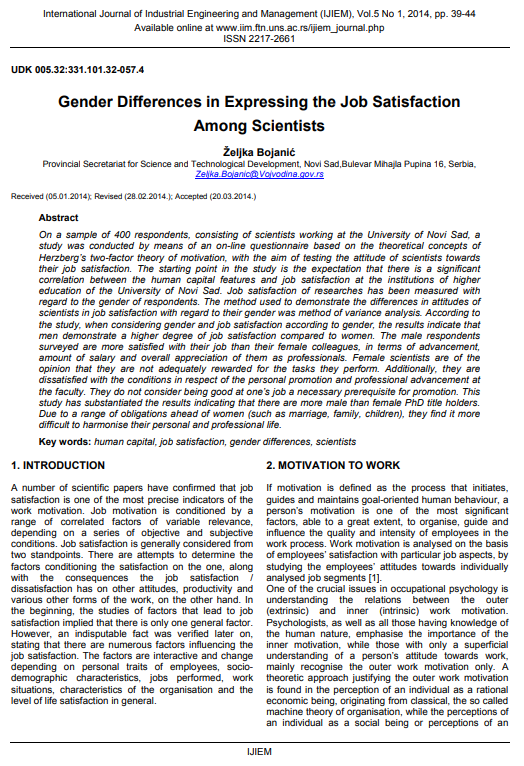
Published 2014-03-30
abstract views: 217 // FULL TEXT ARTICLE (PDF): 0
Keywords
- human capital,
- job satisfaction,
- gender differences,
- scientists
How to Cite
Copyright (c) 2023 International Journal of Industrial Engineering and Management

This work is licensed under a Creative Commons Attribution 4.0 International License.
Abstract
On a sample of 400 respondents, consisting of scientists working at the University of Novi Sad, a study was conducted by means of an on-line questionnaire based on the theoretical concepts of Herzberg’s two-factor theory of motivation, with the aim of testing the attitude of scientists towards their job satisfaction. The starting point in the study is the expectation that there is a significant correlation between the human capital features and job satisfaction at the institutions of higher education of the University of Novi Sad. Job satisfaction of researches has been measured with regard to the gender of respondents. The method used to demonstrate the differences in attitudes of scientists in job satisfaction with regard to their gender was method of variance analysis. According to the study, when considering gender and job satisfaction according to gender, the results indicate that men demonstrate a higher degree of job satisfaction compared to women. The male respondents surveyed are more satisfied with their job than their female colleagues, in terms of advancement, amount of salary and overall appreciation of them as professionals. Female scientists are of the opinion that they are not adequately rewarded for the tasks they perform. Additionally, they are dissatisfied with the conditions in respect of the personal promotion and professional advancement at the faculty. They do not consider being good at one’s job a necessary prerequisite for promotion. This study has substantiated the results indicating that there are more male than female PhD title holders. Due to a range of obligations ahead of women (such as marriage, family, children), they find it more difficult to harmonise their personal and professional life.
Article history: Received (05.01.2014); Revised (28.02.2014); Accepted (20.03.2014)

